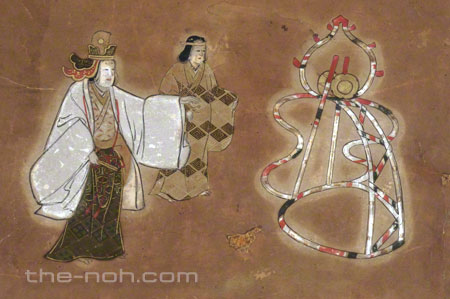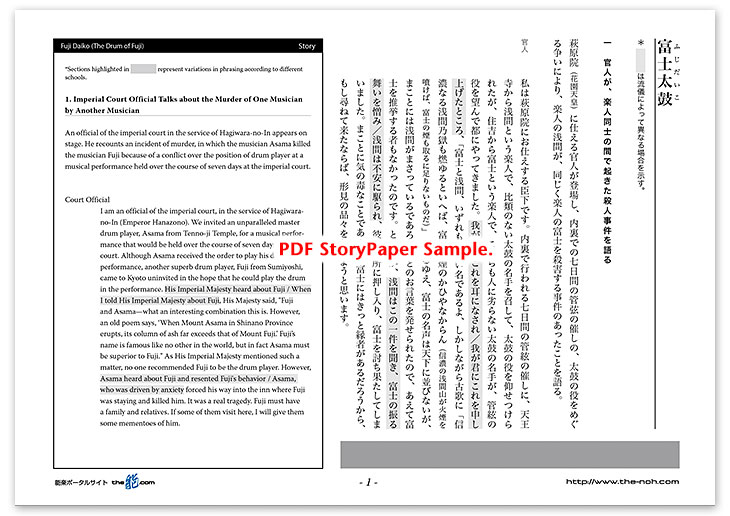
 Fuji Daiko (The Drum of Fuji)
Fuji Daiko (The Drum of Fuji)

![]()
An official of the imperial court in the service of Hagiwara-no-In (Emperor Hanazono) appears and starts to talk about an incident that happened in relation to a musical performance held over the course of seven days at the imperial court. A man named Asama, a musician belonging to Tenno-ji Temple, was called to the court to play the drum. However, another master drum player, a man named Fuji from Sumiyoshi in Settsu Province, also came all the way to Kyoto in the hope of playing his drum in the imperial musical performance. Although no one recommended Fuji for the position, Asama resented Fuji’s actions and killed him. The court official feels sorry for Fuji and decides to give some mementoes of Fuji to his family, if they come to visit him.
Just around that time, the wife and daughter of Fuji arrive in Kyoto. The wife decided to come to Kyoto because she had had a dream in which rain was falling on a moonlit night, which made her feelings of anxiety run wild. Inquiring after the whereabouts of her husband, she finds the court official and arranges a meeting with him. At the meeting, the official tells the wife and daughter that Fuji was murdered by Asama. Fuji’s wife is struck with grief, as the omen of her bad dream has come true. Looking at the daughter her dead husband has left behind, she sheds an endless stream of tears.
The court official presents to the wife a dancing costume left behind by Fuji. Looking at the costume, she thinks that her husband ended up losing his life because he had set his hopes too high in inviting himself to the imperial court. She is filled with deep regret, thinking that she should have done whatever was necessary to forcibly prevent him from going to Kyoto. Then, putting on the costume left behind by her husband, the wife becomes deranged and starts insisting that in fact the drum was her husband’s real enemy. The daughter agrees with her mother and beats the drum. Eventually, the ghost of Fuji seems to take possession of the wife. Taking her daughter’s place, the wife now beats the drum bitterly and also performs a dance.
Dispelling her feelings of resentment, the wife beats the drum to the tunes of Senshū-raku and Taihei-raku to celebrate the reign of Emperor Hanazono. Then taking off the costume, she gazes into the drum, the memento of her dead husband, and leaves to return home.
![]()
The parting of husband and wife, as well as of father and daughter, provides the undercurrent to this drama. The murder triggered by trouble between two musicians adds a tragic element that serves to create the unique atmosphere of this play.
Neither the murder victim (Fuji) nor the murderer (Asama) make an appearance in the drama, which also does not describe the bloody scene of the murder. The story begins with the narration of the story of the murder that had already happened some days prior. The lead character, Fuji’s wife, does not show a grudge or anger which she might bear toward the murderer Asama. Instead, she only expresses regret that she could not stop her husband’s course of action. However, separated from her husband by his unjust death, feelings of bitterness well up inside of her and with nowhere else to go, her resentment is projected upon the drum. She tries to free herself from her feelings of resentment by letting her daughter beat the drum, but apparently that is not enough. Possessed by the ghost of her husband, she herself takes to beating the drum. Whether the ghost actually possesses her or not is not the critical point of this scene that emphasizes the wife’s deep feelings of resentment by implying that her behavior is deranged, just as if she were possessed.
In this scene in which she vents her intense resentment, vocals (utai) are performed with a unique tempo and rhythm. Having donned the costume that is a memento of her late husband, she performs a dance with a quickly changing tempo. This scene conjures forth an eerie, hair-raising atmosphere that will send chills through the audience. Although her resentment was finally cleared away, the final scene of the wife gazing into the drum provokes indescribable sentiments that will linger with the audience for some time.
From the storm of raging emotions to the quiet calm of sadness and resignation, you will be fully immersed in the range of emotions depicted in Noh drama.
There is a Mugen Noh play, Ume’eda, that is a related to this play. It tells the story of the ghost of Fuji’s wife.
STORY PAPER : Fuji Daiko (The Drum of Fuji)
Story Paper presents noh chant stories in modern speech, with story outlines, highlights and more using Adobe PDF format, which can print out and zoom in. Print out the pages and take them with you when you see the actual noh performance.

The copyright of Story Paper is held by the Noh.com. Story Paper is for individual use only. It is prohibited by the copyright law to distribute or publish printed-out Story Paper pages without prior consent. For more information, check the credit and disclaimer pages.



 [Fuji Daiko (The Drum of Fuji) : Story Paper PDF : 475KB
[Fuji Daiko (The Drum of Fuji) : Story Paper PDF : 475KB